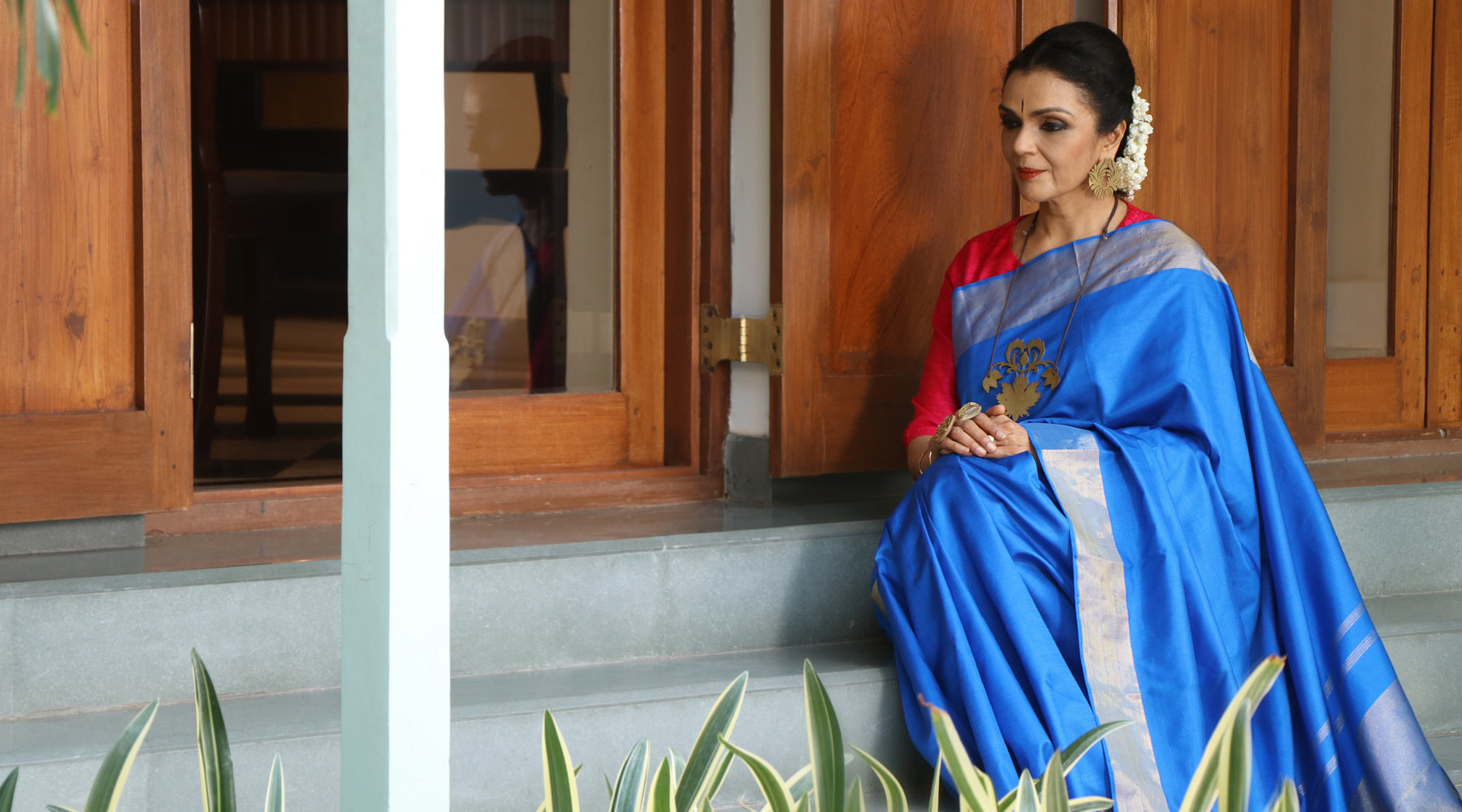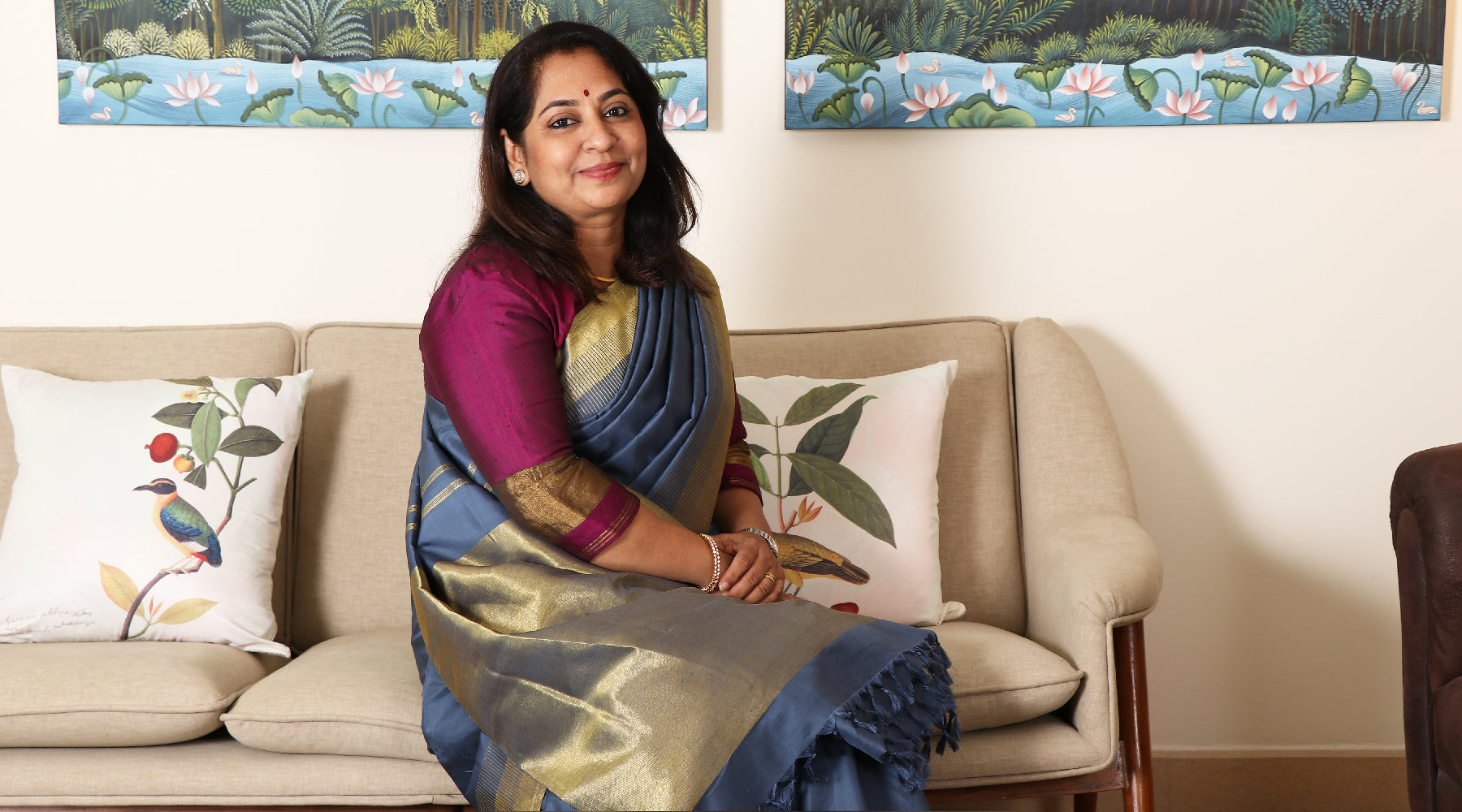KANAKAVALLI VIGNETTES : Dr.Uma Ram - Scent Of A Woman

After delivering 6,500 plus babies, Dr. Uma Ram, Director and Consultant Obstetrician and Gynaecologist, Seethapathy Clinic and Hospital, continues to remain fascinated not only with the whole process of child-birth, easily among the greatest miracles of nature but also of being an integral part of what is an amazing journey in the life of a couple ready to welcome a baby into their lives…
Taking time off consulting, and after a round of checking in on all cases that require her intervention, Dr Uma Ram delights in the pleasure of browsing through Kanakavalli, and picking her favourites things that make her look good, and feel good. Akhila Krishnamurthy captures key insights from an hour-long conversation…
SCENT OF A WOMAN
“Because firsts are always special but over the years, your perspective changes a little”
My first experience of a delivery was as a medical student and needless to say, I, like many others, was apprehensive whether I’d do the right thing. It was fascinating though to witness the birthing process. But it’s very different when you actually deliver a child, as a professional, on your own. Your heart’s a bit in your mouth while you do it.
I remember my fist-ever delivery, quite vividly. It was at the E V Kalyani hospital on December 12, 1993. It was a fabulous feeling and that emotion has continued over the years but with experience, as you do more, you also tend to anticipate more because you know what is going to happen.
Yet I’d say this – even after delivering 6,500-odd, the excitement is not merely the actual process of birthing but also being a part of what is an amazing process for a couple that is having a baby.
“The process of delivery is science but with a heart”
Child-birth is an extremely scientific process but because of the nature of the event, and because you are actually participating in something that involves other people and their emotions, there is a certain beauty and connection that happens along the way. It’s not surgical in that sense of the word; of course you have to be technically precise, alert and quick but there is a feeling of joy that is bundled into this procedure and that makes all the difference.
“Detachment and empathy are both imperative”
The process of child-birth is a long, nine-month haul. And even though couples may choose to consult with you because of how good you may be as a medical practitioner, it is imperative you balance that prowess and a sense of detachment with empathy. As a woman, I’ve also learnt, over the years, to keenly understand a woman not merely from a physiological point of view but also respond to her anxieties and concerns that may stem from her socio-cultural context.
I remember this couple who was due to have a baby in two weeks but the father of the girl kept coming to the clinic asking me if everything was fine and if we could actually deliver her before her due date. I let it pass the first time; the second time, I sent him back re-assuring him all was well. The third time when he returned, I asked him, “Now you tell me, is everything okay?” That’s when he opened up and told me this story of how their family astrologer had actually predicted that his daughter would never have a child. As a result, there was a great deal of anxiety over the arrival of the new one. That story taught me a lot about how society and other factors can have a huge, sometimes even negative impact on the couple and its family.
Situations like these need to be addressed rationally and with empathy. I assured him that we would monitor her more closely and then plan an induction. She delivered a healthy baby girl two weeks later.

There was a time when I knew almost all the people I was taking care of. But now, with the volume, this isn’t always possible. So, the effort has been, right from the start, to build a strong team, and train them to engage with people in the same way that I believe I do - with care and commitment. We believe in good practices that are essentially evidence-based. We are also very conscious to always keep the woman’s perspective in the centre of what we do. And most importantly, we believe we must be utterly honest and as open as possible with all the people we show care.
“Some experiences allow me to recognise how privileged I am”
Many years ago, there was a woman from Rajasthan who came to us to help her deliver her second baby. As soon as she went into labour, she began asking for pain relief. I asked her how she managed her first, without an epidural, that too at home. “I didn’t have a choice,” she said, “I was left alone in a room, to fend for myself, all through the day, and when the baby was ready to pop out, a mid-wife just walked in and delivered the baby. Here, all of you are fussing over me and asking me how I feel, etc. Why not exercise that option?”
There are also cases where a woman is in terrible pain and is begging literally for an epidural and her husband or family won’t let her take it.
Those are moments when you realise that women, in reality, are not empowered to make a choice. And mind you, this can happen even among the most educated, modern families. These are moments when I recognise how privileged I am.

“Being well-dressed is a way of life for me”
At a time when I started practice, in the heart of Mylapore, fresh out of medical college, I knew I had to do whatever it took to be taken seriously. In order to get that stamp of approval, in a sense, I began paying attention to what I wore. Saris became the obvious choice and I loved it. Today I have a huge collection and I enjoy pairing them with an array of blouses that I like to experiment with. So over the years, being well-dressed is a way of life. Plus, when you look good, you feel good.
Over the years of looking good and feeling good, I’ve engaged a great deal with Ahalya, and have been fascinated with not merely her abundance of creativity but also how she has the innate ability to engage with a client, patiently and deliberately and envisage a wearable work of art – jewellery or a sari – that is rooted in tradition but is relevant to the way we live our lives now.
EXPLORE DR. UMA RAM'S KANAKAVALLI GUEST CURATION HERE



